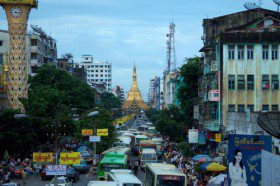 This is part of a series in which we share reports from Harvard students who have traveled to South Asia with support from a SAI grant.
This is part of a series in which we share reports from Harvard students who have traveled to South Asia with support from a SAI grant.
By Jasmine Chia, Harvard College ‘18
This summer, I traveled to Myanmar and was able to do three things: learn Burmese reading and writing, change my thesis topic to a more suitable and interesting topic, and finally to make Burmese friends and connections. My initial objective in going to Myanmar was to research the Vipassana movement, with the intention of going to various temples that practiced this meditative form of Buddhism and interviewing participants to understand how the movement towards Vipassana Buddhism may be linked to political engagement. This was to be a comparative piece comparing Vipassana Buddhism in Myanmar to the Buddhism of the Thammakaya sect in Thailand, which also preached a form of Buddhism modernism that emphasized an individualist experience of enlightenment over a communal form of religious engagement. However, through a series of serendipitous events, I stumbled on a much more interesting phenomenon in Myanmar in explaining the links between capitalist religion and political engagement.
When I initially got to Myanmar, I was lucky enough that my timing coincided with the beginning of one of the most well reputed Burmese courses taught in Yangon, Bama Zaga by John OKell and Yu Yu Khin. For the first two weeks of the summer I immersed myself intensely in these language classes, spending every day at the French Institute studying Burmese and making sure that I did the homework so I would consolidate my knowledge. At the end of two weeks I was able to read comfortably and pronounce difficult Burmese words, as well as write my name and converse in very basic Burmese. This was immensely helpful, not in conducting my research but in making connections with Burmese people. At the institute, I was also surrounded by many researchers and NGO workers working in interesting fields, and in speaking with them I was able to increase my understanding of Myanmar’s political issues and how best to conduct research in the country. Whilst the Rohingya issue was not the paramount political issue in Myanmar that international media makes it out to be, it was certainly sensitive to talk to people about religion, especially with regards to politics.
As I finished the language class and began meeting up with contacts in Myanmar to begin my research, by chance I was connected with someone working at Myanmar’s biggest bank, KBZ Bank. I went to speak with him about Myanmar’s banking sector in general, and as we discussed the challenges of creating the trust required for people to transition from a cash economy to a credit economy, he told me about a fascinating phenomenon that was a big challenge for modernizing the country: the Hundi system. The Hundi system is an informal, underground system of monetary transfer that allows for the many international Burmese migrants to send their money home. Developed under the socialist military regime when economic activity was discouraged and people had to risk their lives to cross the border, the system allows payments to be made by an agent in a distant location and the difference to be settled between the agents later on. Even as bank remittance options– such as those offered by KBZ or AYA – became available and legal, the simplicity and flexibility of the Hundi system means that it remains a key challenge for banks to overcome.
To me, this was reminiscent of James Scott’s thesis on how Myanmar’s harsh geography – the aggressively hilly regions to the north contrasting starkly with the floodplains to the center/South – has shaped the politics of the region, creating different state identities and also allowing a space for rebels to shape a stronghold in opposition to the center. To some extent, this geography has facilitated the civil war that remains ongoing amidst Myanmar’s peace talks, and it is this geography – and this lack of trust in the state – that determines the success of the Hundi system. The idea of geography as a determinant for Myanmar’s political and economic future, mitigated and understood through the Hundi system, seemed to me a perfect pivot for my thesis topic.
As this was already halfway through my summer, I had to seek out secondary sources to understand the context of the Hundi system. I was able to access libraries at the Yangon University as well as resources from researchers in the area, and especially crucial was meeting Dr Toe Hla and interviewing him on money lending practices in Myanmar. He gave me insight into the origins of the money lending system and was able to speak generally to the relationship between money lending and political cronyism, as well as access to capital and growth of political power. Moreover, I was able to interview John Buchanan, who writes about the economy of Myanmar in the 21st century, and he recommended Sean Turnell’s Fiery Dragons, which seems to be the only piece of literature I’ve found in English with a section devoted to the Hundi system.
Whilst the lack of secondary literature has made studying Hundi more difficult, it also means that this is an area where primary research is crucial, and the SAI grant allowed me to directly interview people and understand firsthand how the Hundi system works. I spent the rest of the summer shadowing the man at KBZ bank and doing research for him on marketing techniques to overcome the Hundi system (or to act as a complement to it) and was given access to a lot of resources through this connection as well.
